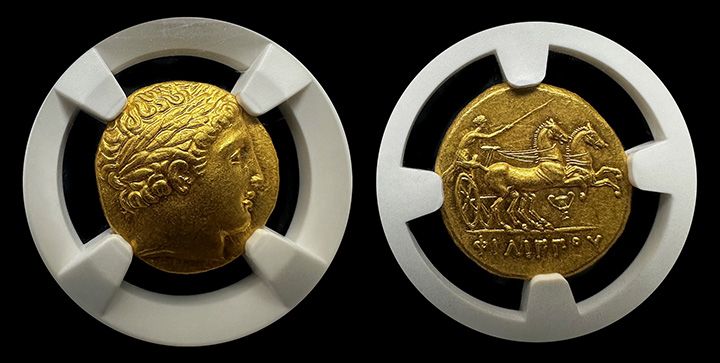
Early Life and the Division of the Empire
Philip II of Macedonia, the father of Alexander the Great, was one of the most influential figures in ancient history. His rise to power reshaped the region, and his leadership laid the foundation for a powerful Macedonian state. This blog will explore how he came to power, his key accomplishments, the challenges Macedonia faced during his reign, what eventually happened to him, and how he is remembered today.
How Philip II Came to Power
Born in 382 BC, Philip II was the youngest son of King Amyntas III. Political chaos shaped his early life as Macedonia faced external threats and internal instability. After the death of his brother, King Perdiccas III, in 359 BC, Philip assumed control as regent for his young nephew. However, Philip soon declared himself king, taking complete control of the kingdom.
Philip’s ascent to the throne was not easy. He faced rivals for power, both within Macedonia and from foreign enemies like Athens. Using diplomacy and military strength, he neutralized these threats. By securing strategic marriages and alliances, Philip consolidated his power. This quick and strategic maneuvering allowed him to stabilize the kingdom and begin his reign.
Accomplishments and Achievements
Philip II is best remembered for his military and political innovations. One of his most significant achievements was the reformation of the Macedonian army. He introduced the phalanx, a formation of soldiers armed with long spears called sarissas. This new strategy transformed Macedonia’s army into a formidable force.
With his military reforms in place, Philip embarked on several campaigns to expand Macedonian territory. In 352 BC, he secured a significant victory by defeating the Phocians and taking control of Thessaly. This gave him access to valuable resources, further boosting his kingdom’s power. Over the years, Philip continued his military expansion, bringing many Greek city-states under Macedonian control.
By 338 BC, Philip had achieved one of his greatest victories at the Battle of Chaeronea. He led his forces to defeat a coalition of Greek city-states, including Athens and Thebes. This victory marked the end of Greek independence and established Macedonia as the dominant power in Greece.
Challenges During His Reign
Philip II’s reign was not without difficulties. Macedonia was initially weak, surrounded by hostile neighbors. He had to fend off frequent invasions from the Illyrians and Thracians, who threatened his kingdom constantly. His early reign focused on securing Macedonia’s borders and defending against these external enemies.
Philip also faced significant internal challenges. Noble families in Macedonia opposed his centralized rule, and many Greek city-states viewed Macedonia as a foreign power trying to dominate Greece. Athenian statesman Demosthenes, for example, was a fierce critic of Philip. Despite these challenges, Philip used diplomacy and alliances to maintain his hold on power.
Through strategic marriages, Philip neutralized much of the internal opposition. For instance, his marriage to Olympias of Epirus strengthened his ties with neighboring states. These alliances helped stabilize his reign and allowed him to focus on expanding Macedonia’s influence in Greece.
What Happened to Philip II
Philip II of Macedonia’s reign suddenly ended in 336 BC when he was assassinated during a wedding celebration. The reasons for his murder remain debated. Additionally, some suggest it was a personal vendetta by his bodyguard, Pausanias. Others believe it was a political plot, possibly involving his wife Olympias or his son Alexander.
Despite his assassination, Philip left behind a powerful legacy. His son, Alexander the Great, would go on to build an even larger empire, but Philip’s groundwork made this possible. Consequently, his military innovations and political strategies were crucial for Macedonia’s rise as a superpower.
How Philip II Is Remembered Today
Philip II’s legacy endures as one of the greatest rulers of ancient Macedonia. Though his son, Alexander, often overshadows him, Philip’s accomplishments were crucial in shaping the course of ancient history. He transformed Macedonia from a small, unstable kingdom into the dominant power in Greece.
Today, Philip is remembered for his military and political genius. The royal tombs at Vergina, believed to be Philip’s burial site, offer insights into his reign and the grandeur of the Macedonian court. His likeness appears on coins, which remain prized by collectors and historians alike.
Philip II’s impact on history is undeniable. He united Macedonia, established control over Greece, and laid the foundation for the Hellenistic world. Equally important, his legacy lives on through his son’s conquests and the empire he helped to create.
Philip II of Macedonia - Gold Stater
The Kingdom of Macedon Philip II Gold Stater is a stunning artifact from the reign of one of ancient Greece’s most powerful rulers. Certified by NGC Ancients in Choice About Uncirculated condition, this 8.61-gram coin features a perfect Strike rating of 5/5 and a Surface rating of 4/5. The obverse showcases the head of Apollo, while the reverse depicts a biga, representing Philip II’s military strength and triumphs. A true masterpiece of ancient coinage, this stater captures the prosperity and influence of Philip II’s reign. Furthermore, it offers a tangible connection to Macedon's cultural and historical legacy. This coin and other coins like it are available for purchase at Austin Rare Coins & Bullion today!
